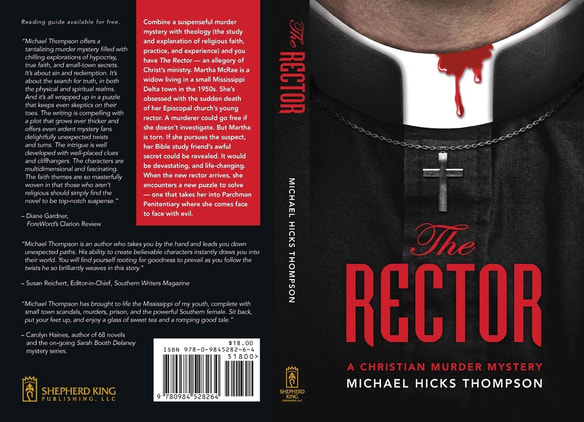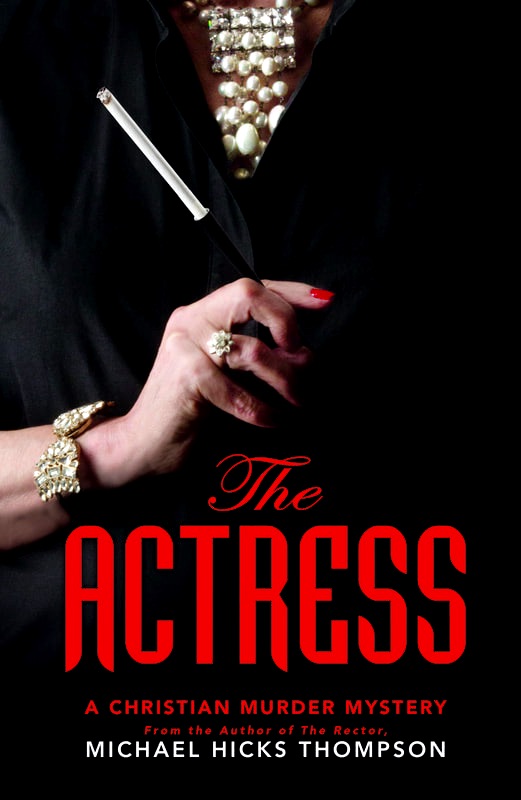We’ve published graphic novels, e-Books in all formats, hard-backs, trade paperbacks, and in audio book format.
Audio books are growing rapidly. We help you with adult and Children’s narrator auditions and pricing negotiations.

Punch the Audio Book button and hear a reading from The Rector, available on Amazon.
Design & Printing
We lead you through the ISBN, barcode, and Library of Congress Control number processes.
We’ve worked with world-class book designers and printers from Kowloon, China, to New Jersey to produce high quality books. For example … the BEST GRAPHIC NOVEL of 2013 from The International Book Awards (USA Books), a Silver IPPY from the Independent Publisher Book awards, to Beverly Hills Book awards and Mystery & Mayhem finalists. Jump over to SAMPLE PAGES for “inside looks.”


MARKETING
The number one obstacle for authors isn’t writing the book, it’s marketing the book. Our president spent 35 years as an ad agency/digital/PR firm owner. Now, he writes and publishes Christian books. He’s taught workshops on writing, publishing, and marketing.



The Actress; Sequel to The Rector.
-Introduction
I can’t let this story go untold. Besides, who else could tell it?
My name is Martha McRae. I’m the publisher and sole writer for the Gazette, a weekly newspaper for Bethel County, Mississippi.
Most of my stories about the murders of our church rectors are in the Gazette archives. They’re also in The Rector, the first book in my Solo Ladies Bible Study series.
But here we are again in tiny Solo, Mississippi.
This time there’s a celebrity in our midst.
PART I
The Diva
Chapter 1— The Intruder
A filthy windowpane separated the most famous actress in America from the dark silhouette outside her bedroom. Moving to the window, she steadied the pistol in her hand, and willed herself to breathe deeply, silently.
A stranger to the Mississippi Delta, she was unaccustomed to the outside cricket’s magical midnight chirping. The distant sound calmed her nerves. For a moment.
Standing six feet from the window, she gripped the pistol tighter and slid her index finger to the trigger. She leveled the barrel on the dark figure outside. The intruder’s hand moved toward the window. She fired the pistol through the glass, into the darkness, into Andrew Dawkins’s upper torso.
America’s diva, Tully Ivey, had shot and killed a local farmer. It was August 10, 1962, in Solo, Mississippi.
___
I know these things because I’m the only reporter for The Gazette. It was my business to know. Besides, it’s easy to know everything that goes on in Solo, both good and evil. Especially if you run a boarding house. And I do.
We’d always been a speck of a town—a constant 310 souls. Deaths replaced by births. Solo is ten miles north of Parchman Farm Penitentiary, and thirty miles south of Greenlee, the government seat for Bethel county.
___
The Bethel County Sheriff’s Department arrived an hour after the shooting. Five Hollywood RTO Studio executives hovered around Dawkins’s body. Sheriff Butch Turnbull made a mental note of Tully Ivey crying on a man’s shoulder. Reaching down to inspect the body, he found a blood-soaked shirt, a hole in Dawkins’s chest, and no pulse. A note was clenched in his right hand. A pistol lay in the grass.
Turnbull bagged them both, the gun and the note.
The note would hold the key to Tully Ivey’s future.
___
Sheriff Turnbull took her to his Greenlee office for questioning. I drove there, at Shirley Dawkins’s request. Shirley had called and asked me to find out what happened to Andrew. She was sobbing and hysterical. I felt for her.
Walking into the sheriff’s office at two in the morning, I saw the famous actress sitting across a desk from Sheriff Turnbull. The sheriff was a hefty man, built like a bull with a crew cut and bushy eyebrows. There was another man, sitting next to Ivey. He was bent over, head nestled in his hands, looking tired.
I heard Tully Ivey say, “I saw him scratching on the window. What would you expect me to do, sheriff?” Tully Ivey wasn’t the least bit arrogant or even irritated when she said those words. She was calm and collected.
“It was dark,” Sheriff Turnbull said. “How did you know it was a man? You said ‘him.’”
As I walked closer, the sheriff turned, surprised to see me.
“Martha, what are you doing here? You need to leave.”
“Butch, I’m here for Shirley. She needs to know what happened.”
Reluctant at first, he nodded his agreement, turned back to Tully Ivey, and asked again how she knew it was a man.
“I didn’t know it was a man. Not then,” she said. “Like I told you, eventually I went outside to see if someone was still there.” Her smile was pure Hollywood; her chemical white teeth, too polished to ignore.
“That’s when I discovered the body of a man in the grass. I was frightened to death,” she told the sheriff.
She turned to me. “Wouldn’t you be? … Who are you?” she asked, arching an eyebrow.
I didn’t respond. Maybe I was star-struck. But I did comprehend the complexity of what Sherriff Turnbull would be facing, dealing with this ultimate diva and all.
Turnbull asked her: “You said earlier that you hardly knew Mr. Dawkins. Why were you crying over his body?”
“I was upset. Oh, I knew him a little,” she said, holding up two squeezed fingers in as sexy an act as her friend Lauren Bacall could have achieved. “He had a small role in the movie. I never thought he was a bad person.”
“Now, Miss Ivey … may I call you Miss Ivey?” the sheriff asked, apologetically.
“Why, of course. That’s what my close friends call me.”
Dropping his head, he placed a fist to his mouth and faked a cough. “I’m not sure you should refer to me as a close friend. Please understand I’m investigating your involvement in Andrew Dawkins’s death.”
“Well, okaaay,” she said, smiling at his polite rebuke. “Go right ahead, ask me anything.”
“I should have asked if you’d like to have an attorney present?” he asked.
Motioning to the man sitting next to her, she said, “Randall Carr is not only my agent he’s my attorney. And besides, I don’t need an attorney. It was self-defense.”
Randy Carr raised his head and looked at her, his eyes, bloodshot; his expression, blank.
“Very well,” the sheriff said, stone-faced. “What was Andrew Dawkins doing at your window?”
“Why I haven’t the faintest idea,” she said, batting two Hollywood eyelashes.
“Had he ever been to your window at Capp’s house before that night?”
“Heavens no.”
“Now the pistol. Tell me how it ended up outside, beside his body,” the sheriff said.
“I don’t remember. I suppose I took it with me, outside, not knowing if someone was still there. I wasn’t sure if I’d shot someone. Not until I went outside.”
She reached in her purse to pull out a silver-engraved cigarette holder. She selected a cigarette and inserted it into a four-inch-long, shiny black holder. Deputy Cox, who’d been leaning against the doorjamb, was quick to pull a Zippo from his trouser pocket and light her all white cig.
She tossed her head back, inhaled, pursed her rose bud lips together, and blew out a thin, steady stream of gray smoke. Cox smiled, dropping the lighter back in his trousers.
I thought, Surely, he’s smitten.
The sheriff kept probing. An hour later, after a dozen or more perfunctory questions, Sheriff Turnbull finally said, “I’m going to release you under your own recognizance. But you must stay in Solo and not leave. Okay? Do you understand?”
“Yes, sheriff,” she said, “that will be fine.”
Stamping out her third cigarette, she stood, as tall and regal as her reputation. She oozed grace and charm, and a contagious confidence as if she never expected to stay overnight anyway.
Not a single night in the cell. Incensed, I wondered if Turnbull wasn’t also enamored with her.
Turnbull told Cox to drive Ivey and Carr out to Capp’s house. “Be my pleasure, sheriff,” Cox said, spreading his long, skinny legs like a cowboy, with a pleasant grin plastered across his red-cheeked face.
After she left, I asked the sheriff about letting her go. His response was lame: “She’s telling the truth, Martha. It was self-defense. You’ll just have to get over it.”
Never, I thought.
Too late to drive out to Shirley Dawkins’s house, I phoned her from the sheriff’s department.
“I’m so sorry about Andrew, Shirley. I believe it was just a terrible accident.”
I explained what happened. I didn’t mention the note.
“But Martha, what was Andrew doing at her window? Why was he there?”
“I don’t know, Shirley. But I’m going to find out. Trust me.”
“You will? Oh, thank you. Thank you so much, Martha. You don’t know how much that means to me,” she said, still sobbing.
Leaving, I thought, Shirley Dawkins deserves to know why her husband died. I made a vow to root out any evil lurking behind his death … if there was any.
___
Hollywood producers have a habit of coming to the Mississippi Delta in search of dirt-rich, titillating stories. They came for Tennessee Williams. William Faulkner. And now me, Martha McRae—a small-town widow surviving on a ragtag weekly newspaper, a boarding house, and a book I’d written about the evil and the good that had occurred in Solo, Mississippi in the late 1950s.
But I soon realized RTO Studios had come for the evil in that book, not the good.
___
Some of the movie executives were renting Capp Grater’s house. Most of the regular crew—location scout, soundman, grips, wardrobe, makeup people—were staying at the new Holiday Inn in Greenlee. Andy Chinn, the movie’s young scriptwriter, had rented an upstairs room from me. “For peace and quiet” he had said. “I need a place where I can think and write. No distractions.”
One night, Andy went out drinking with the crew. Oneeda Mae Harpole, my best friend, and Solo’s busiest gossip, sneaked into his room. She snooped around and found the movie script. After reading some of it, she left it and came downstairs with the news.
“Martha, it’s about capital punishment in the south. They came to make some ugly statement about Mississippi—how immoral we are for executing Sonny Sartain,” she said, smacking on her Juicy Fruit, causing my mind to wander back to Sartain’s execution. (I was one of the actual witnesses at Parchman Penitentiary the night he was executed.)
So they’re making a movie about Sonny Sartain—Satan’s minion, I thought. Sonny Sartain was as close to the devil as you’d ever care to be.
“The Killing. That’s the name of the movie script,” Oneeda added.
“And to think … all this time, we thought they were here to make a decent movie. A movie about Father Davidson sacrificing his life two years ago,” I said. “Oneeda, that would’ve been a fine story—something purer than the best movie you could ever imagine. You said they’re calling it The Killing?”
“Exactly. And the producer, Alston Capron, told everybody it was a movie about Father Davidson.”
“Well, he lied, didn’t he?” I said.
___
The irony is that Alston Capron had inherited a killing of his own, and a delay in his film schedule he could ill afford. He was not a happy man. After four weeks of filming, “RTO Studios decided to halt production until the international starlet felt up to being back on camera, ‘after such an ordeal.’” That was her agent, Randy Carr’s rendition of the reason.
Maybe the shooting was self-defense. Who knows? In the Mississippi Delta, we’re not sure who committed anything. Including murders. In this case, we only knew who pulled the trigger. But she had confessed. She claimed self-defense. Maybe she had every right to shoot somebody lurking outside her window in the middle of the night.
But what was Andrew Dawkins doing there?
Andrew had been a well-respected cotton farmer in the county until he ditched Mary Grater and married Shirley from Memphis. Our Solo Bible Study group thought Mary and Andrew would marry. But then one day–swoosh—he was gone. Turned up a month later with Shirley on his arm. He stayed out on his farm and did his shopping in Greenlee, probably because our little study group didn’t want to see his face again.
Mary and ‘Little Michael’ were still boarding with me. After Capp went to prison, Mary said their house gave her ‘the creeps,’ so she became a permanent boarder with me, along with our latest rector, Father Paul Compañero.
But Shirley turned out to be as nice as they come. And, she was always in church. Every Sunday. Matter of fact, Mary and Shirley became good friends in our Bible study group. But Andrew was too isolated to see any of this.
Andrew did leave something behind. The note. And it led to an investigation nobody expected.
